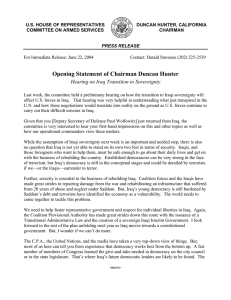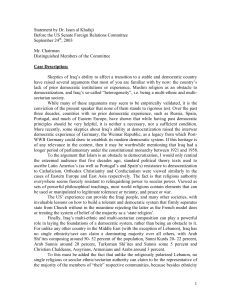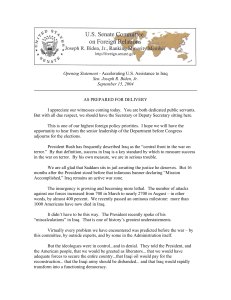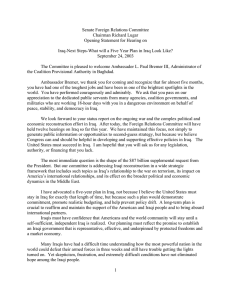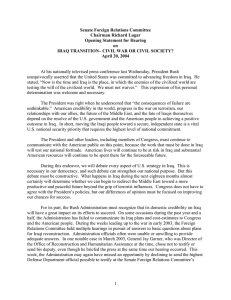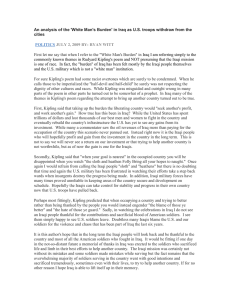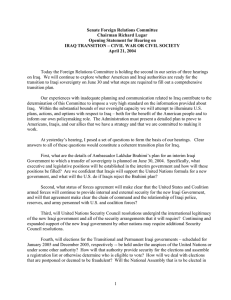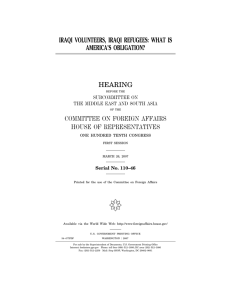Embargoed until April 20, 2004 at 9:30 AM
advertisement
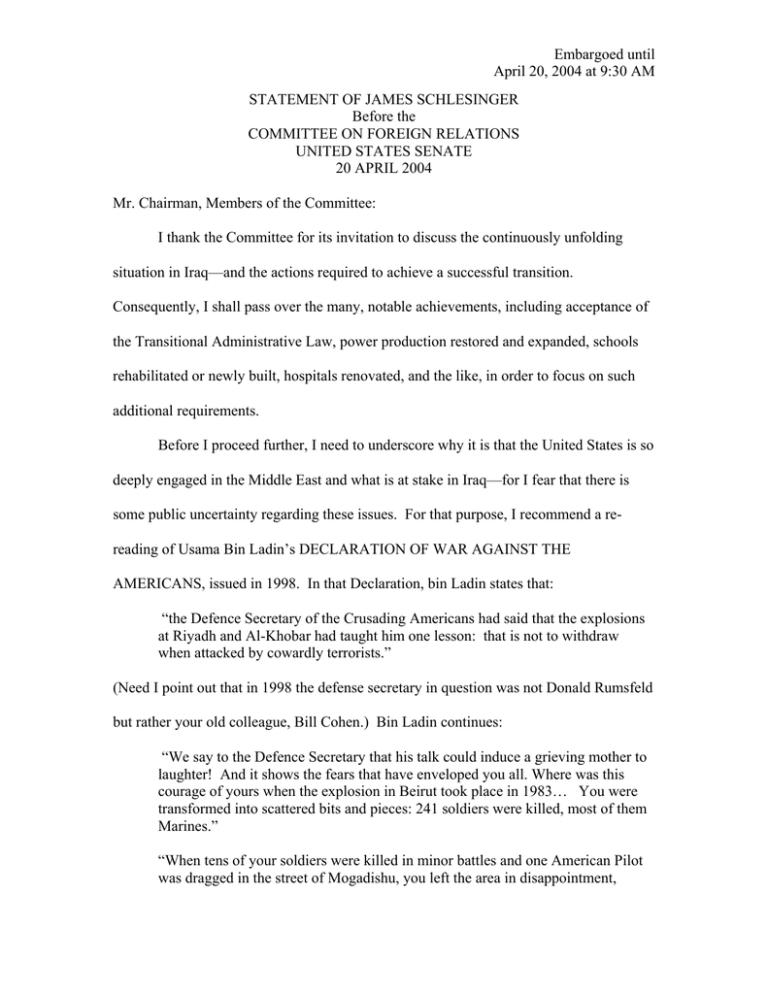
Embargoed until April 20, 2004 at 9:30 AM STATEMENT OF JAMES SCHLESINGER Before the COMMITTEE ON FOREIGN RELATIONS UNITED STATES SENATE 20 APRIL 2004 Mr. Chairman, Members of the Committee: I thank the Committee for its invitation to discuss the continuously unfolding situation in Iraq—and the actions required to achieve a successful transition. Consequently, I shall pass over the many, notable achievements, including acceptance of the Transitional Administrative Law, power production restored and expanded, schools rehabilitated or newly built, hospitals renovated, and the like, in order to focus on such additional requirements. Before I proceed further, I need to underscore why it is that the United States is so deeply engaged in the Middle East and what is at stake in Iraq—for I fear that there is some public uncertainty regarding these issues. For that purpose, I recommend a rereading of Usama Bin Ladin’s DECLARATION OF WAR AGAINST THE AMERICANS, issued in 1998. In that Declaration, bin Ladin states that: “the Defence Secretary of the Crusading Americans had said that the explosions at Riyadh and Al-Khobar had taught him one lesson: that is not to withdraw when attacked by cowardly terrorists.” (Need I point out that in 1998 the defense secretary in question was not Donald Rumsfeld but rather your old colleague, Bill Cohen.) Bin Ladin continues: “We say to the Defence Secretary that his talk could induce a grieving mother to laughter! And it shows the fears that have enveloped you all. Where was this courage of yours when the explosion in Beirut took place in 1983… You were transformed into scattered bits and pieces: 241 soldiers were killed, most of them Marines.” “When tens of your soldiers were killed in minor battles and one American Pilot was dragged in the street of Mogadishu, you left the area in disappointment, humiliation, and defeat, carrying your dead with you. Clinton appeared in front of the whole world threatening and promising revenge, but these threats were merely a preparation for withdrawal. You had been disgraced by Allah and you withdraw; the extent of your impotence and weaknesses became very clear.” As bin Ladin had explained earlier in the Declaration: “Efforts should be concentrated on destroying, fighting, and killing the (American) enemy until, by the Grace of Allah, it is completely defeated.” The task is stated quite simply—“killing Americans” (and other infidels). In June, 2002, bin Ladin’s spokesman, Suleiman Abu Gheith, placed this statement on the al Qaeda website: “We have the right (italics added) to kill 4 million Americans—2 million of them children—and to exile twice as many and wound and cripple hundreds of thousands.” They may be fanatics, but they are deadly serious and thoroughly persistent. We must anticipate, therefore, a conflict that will continue for many years. Usama himself has opined that, “when the people see a strong horse and a weak horse—they naturally gravitate toward the strong horse.” Consequently, this country must conclusively demonstrate that we are NOT the weak horse. Withdrawal before we have successfully stabilized Iraq is, therefore, not an option. It would be dramatically more visible throughout the Middle East and elsewhere than were those earlier retreats cited by Usama. I recognize that inevitably debate will continue regarding at least the timing of our move into Iraq. Nonetheless, we must not allow the political contentions of an election year to create any impression that we are anything but united in our determination to persevere and to prevail in Iraq. Success is the only acceptable course of action. 2 How then are we to be successful in sustaining order and stability in Iraq?—only by embracing certain fundamental realities. First and foremost, establishing reasonable security is the prerequisite for achieving the goals of political stability. In principle, we have come to accept this reality, but in practice we have been too slow effectively to act upon it. Second, neither the American nor the coalition forces can, by themselves, impose security on Iraq. Iraqis themselves must provide indispensable support. Only Iraqis can gather the intelligence to identify the regime remnants and foreign terrorists who must be largely neutralized before adequate security can be insured. Moreover, it will be essential for Iraqi security forces to be the principal element in rooting out terrorists and destroying their cells—with the coalition military increasingly in a supporting role. “We will stay the course” may be a necessary guideline or exhortation, but it is not a strategy. “We will stay the course until we have an Iraqi force capable of providing reasonable security for the people of Iraq”—is a strategy. But that implies a viable plan to create such a force. It also implies that we should not expect the level of security in, say, Denmark or Japan. Regrettably, we have allowed almost a year to pass without creating an effective Iraqi security force. While we have recruited several hundred thousand Iraqis into the security force, those forces have tended to melt away in times of difficulty. It may be that this behavior reflects a problem of morale—thought that was not the judgment of those who observed at least the CDC, as it was organized. Possibly it reflects a deeper 3 unwillingness to use force on the recalcitrant fellow Iraqis. But the most obvious answer is our own failure properly to train and properly to equip these security forces. On the equipping issue, all too many months have gone by without appropriately vetted forces being appropriately equipped with weapons, protective gear, and communications. That is a reflection of our own cumbersome budgetary and procurement procedures, which have imposed a high, long run cost on our operations. On the question of training, we have not allowed sufficient time for the training of individuals and the organizing of units with a high degree of cohesion. The task of training Iraqi security forces should be a principal obligation of American and coalition forces in country. Other nations, such as India, even if they have not contributed military forces, may be prepared to participate in training these security forces. Second, we must focus more effectively on economic problems. There is a correlation between the high prevailing unemployment in Iraq and the restlessness and low morale spreading among the populace. Admittedly, initial expectations regarding an immediate and magical boost in living conditions were unrealistic. Yet, months have gone by without the improvement in living conditions that might realistically have been expected. The $18.4 billion that the Congress appropriated for reconstruction should have already begun to alleviate the problem—improving living conditions and expanding employment. It is a shame that so little of that $18.4 billion has been obligated to this point—and even significantly less has been spent. We must get that money flowing. Delay makes the problem worst. Yet, once again, it is our procurement procedures that have imposed these costs upon us. We cannot afford normal peace time procurement procedures—with 60 days to submit responses to Requests For Proposals and another 60 4 days to assess them, etc. Congress can act—quickly. It should assess whether existing requirements result in a penny-wise, pound-foolish outcome—and help ease selfdefeating restraints. Now let me turn to the political transition, while bearing in mind that effectively dealing with the security and economic conditions will necessarily remain the foundation for a successful transition. As this Committee well knows, since November of last year we have been committed to transferring sovereignty to the Iraqis after 30 June. The President has firmly reiterated that he intends to stick to that date. The Administration has indicated that it is inclined to accept Ambassador Brahimi’s proposals for the new Iraqi regime. Both Chairman Lugar and Senator Biden have noted that we would pay a high cost, if we fail to abide by that date. While nothing is ever set in concrete, especially if the conditions within the country were to deteriorate substantially, I would expect that the date for transferring sovereignty to the Iraqis will be met. At that point, the Iraqis themselves will be making decisions regarding the civil order. Yet, once again, time’s-a’wastin’. There are only some ten weeks left before that transfer is to be made. The new American Ambassador has not been chosen—or at least announced. The Embassy team, probably amounting to 4,000 people, has obviously not yet solidified. The overall team has not had a chance to work with each other, to learn their respective roles, in effect to put on “training wheels” for the tasks ahead. The less time available will certainly detract from a smooth takeover from the CPA by the new team. 5 I do not wish to overstate this point. One must recall that the critical issue of security will remain in American hands—and under the control of a selected four-star general. Under United Nations Security Council Resolution 1511, Iraqi armed forces will be “a principal partner in the multinational force operating in Iraq under unified command,” in accordance with the Transitional Administrative Law. Thus, even if the transfer of sovereignty on several issues does not proceed perfectly smoothly, in the crucial area of security (which remains the largest challenge in Iraq) there will be little change. Contrary to a widespread public impression, the transfer of authority on 30 June does not mean that the American role is ending or that we are somehow washing our hands of Iraq. This last must effectively be conveyed to the Iraqi public at large. As we look beyond June 30th, we should expect a closer collaborative relationship between State and Defense than has been our experience to this point. The relationship between the civilians in the CPA, mostly buttoned down in the Green Zone, and the military who have been out in the field, interacting with the Iraqis, has been something less than ideal. After all, it is the CPA that has maintained tight control over the resources, but it is the division commanders that have been in close contact with the Iraqis and know what the local needs are—and have too frequently been obliged to fund local activities out of their quite limited discretionary funds. The civil-military relationship worked far better in Vietnam—after General Abrams took command in 1968. He and Ambassador Bunker worked intimately in deciding what the needs were for the pacification program, and how to allocate resources. We should seek to achieve that degree of collaborative behavior once the new Embassy team comes into play this summer. 6 One final but crucial point. To date, our efforts to communicate with the Iraqis have been inadequate. We have failed to convey to the Iraqis what our intentions are—or have conveyed them belatedly. Consequently, all too many excellent and wellintentioned actions on our part have not gotten through to the Iraqi public. It is almost as important that such plans or such actions be understood, as that they be executed. The American-sponsored television station has not been well designed to attract an audience and has thus been peripheral for Iraqi listeners. The upshot has been that al-Jazeera and al-Arabiya have filled the void. It must be remembered that al-Jazeera’s general manager was on Saddam’s payroll. Al-Jazeera seems to have regularly been tipped off regarding any clashes in country, and, indeed, may have staged such events. It must be recognized that with employment as high as it is, it is easy to buy a demonstration. Indeed, simple payment in cash has been a principal motive for many of those engaged in attacking either Americans or Iraqis. Mr. Chairman, the decision to go into Iraq was a fateful one—not only for Iraqis, but for the larger Middle East and for the credibility of American foreign policy. We must see it through. Coalition forces, as well as Iraqi forces and government officials are now under assault—some calculated and deliberated, but some emotional and mindless. It is time for us to remind Iraqis—“if you want a decent life you must not support the elements that are destroying your country and may actually be seeking a civil war.” We must persuade Iraqis to foresee the consequences of frustrating coalition efforts—in their behalf. Thank you, Mr. Chairman, I shall be happy to respond to any questions that you or the Members of the Committee may have. 7 8

